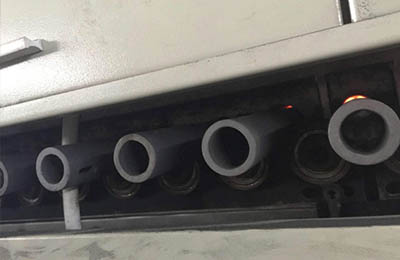Silicon carbide (SiC) rollers are widely used in various industrial applications, such as ceramics, glass, and steel production. These rollers play a crucial role in ensuring smooth and efficient operation in high-temperature and corrosive environments. To meet the specific requirements of different industries, certain parameters need to be considered when manufacturing silicon carbide rollers. This article will discuss the key requirements for silicon carbide roller parameters.

Firstly, the material composition of silicon carbide rollers is of utmost importance. Silicon carbide is a compound made up of silicon and carbon atoms. It is known for its exceptional hardness, high thermal conductivity, and excellent resistance to corrosion and wear. The purity and quality of the silicon carbide used in the roller production process directly affect its performance and durability. Therefore, manufacturers must ensure that the silicon carbide used is of high purity and free from impurities that may compromise its properties.
Secondly, the size and shape of silicon carbide rollers should be carefully considered. The dimensions of the rollers, such as diameter, length, and thickness, should be designed to meet the specific requirements of the application. For instance, in the glass industry, rollers with larger diameters and longer lengths are often preferred to support the weight of the glass sheets and ensure uniform heating and cooling. Additionally, the surface finish and roundness of the rollers should be carefully controlled to minimize any potential defects or surface damage during operation.
Another crucial parameter to consider is the mechanical strength of the silicon carbide rollers. They should be able to withstand the mechanical stress and load applied during operation without deformation or failure. The flexural strength, compressive strength, and hardness of the rollers need to be optimized to ensure their structural integrity and longevity. Reinforcing techniques, such as adding binders or using advanced manufacturing processes, can enhance the mechanical properties of silicon carbide rollers.
Furthermore, the thermal properties of silicon carbide rollers are essential for their performance in high-temperature applications. Silicon carbide has excellent thermal conductivity, allowing for efficient heat transfer during operation. This property is particularly crucial in industries such as ceramics, where precise temperature control is necessary for the firing and sintering processes. The thermal expansion coefficient of the rollers should also be considered to prevent any dimensional changes or cracking due to thermal cycling.
Lastly, the surface characteristics of silicon carbide rollers play a vital role in their functionality. The rollers should have a low coefficient of friction to minimize energy loss and prevent surface damage. Additionally, a smooth and non-porous surface finish is desired to ensure easy cleaning and prevent contamination or sticking of materials. Surface treatments or coatings can be applied to improve these properties and enhance the overall performance of the rollers.
In conclusion, the requirements for silicon carbide roller parameters involve various factors, including material composition, size and shape, mechanical strength, thermal properties, and surface characteristics. By carefully considering and optimizing these parameters, manufacturers can produce silicon carbide rollers that meet the specific requirements of different industries, ensuring efficient and reliable operation in challenging environments.












